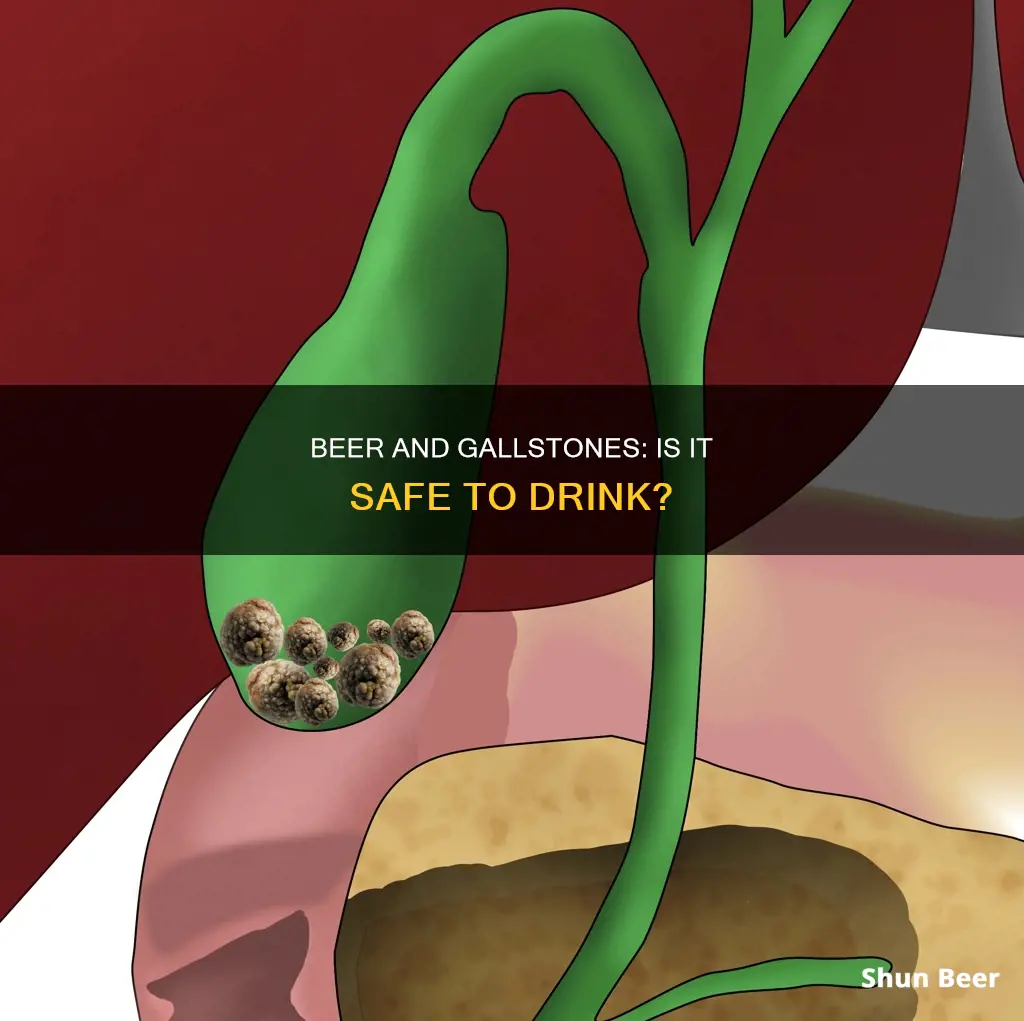
Alcohol does not cause gallstones, but it can still negatively impact gallbladder health. Research suggests that moderate alcohol consumption may lower the risk of gallstones in some people. However, heavy drinking can lead to liver cirrhosis, which is a risk factor for gallstones. It is generally recommended that people consume little to no alcohol, as alcohol can increase the risk of several health conditions. If you have gallstones, it is best to consult a healthcare professional for advice on alcohol consumption.
| Characteristics | Values |
|---|---|
| Can alcohol cause gallstones? | There is no evidence that alcohol can cause gallstones. However, heavy drinking can indirectly lead to gallstone formation. |
| Can alcohol reduce the risk of gallstones? | Research suggests that moderate alcohol consumption may reduce the risk of gallstones. |
| Alcohol consumption recommendations | It is generally recommended to consume little to no alcohol. Moderate alcohol consumption is defined as one drink or less per day for women and two drinks or less per day for men. |
| Heavy alcohol consumption and gallstones | Heavy alcohol consumption can increase the risk of gallstone formation by causing liver cirrhosis, which affects bile production. |
| Alcohol and existing gallstones | Individuals with existing gallstones should avoid drinking alcohol. Alcohol can exacerbate symptoms and increase the risk of complications. |
| Drinking alcohol after gallbladder removal | Alcohol consumption is generally well-tolerated after gallbladder removal. However, moderation is advised, and it is important to follow post-surgery recommendations. |
What You'll Learn
- Research suggests that moderate alcohol consumption may reduce the risk of gallstones
- Heavy drinking can increase the risk of gallbladder cancer
- Liver cirrhosis, caused by heavy drinking, can lead to gallstones
- Alcohol can slow down gallbladder emptying
- Alcohol can increase the risk of pancreatitis, which can lead to gallstones

Research suggests that moderate alcohol consumption may reduce the risk of gallstones
A 2019 analysis published in the journal Gut and Liver reviewed 24 studies on alcohol use and gallstone risk. The researchers found that alcohol consumption was associated with a decreased risk of gallstones. However, the mechanism behind this association is not yet fully understood. One theory suggests that alcohol consumption may increase the rate at which the gallbladder empties, reducing the amount of bile that can form stones. Another idea relates to cholesterol, a common component of gallstones, and the possibility that alcohol consumption may lead to lower cholesterol levels in bile.
It is important to clarify what constitutes moderate alcohol consumption. According to the Centers for Disease Control and Prevention (CDC), moderate alcohol consumption is defined as one drink per day for women and two drinks per day for men. It is important to note that the amount considered as one drink varies depending on the type of alcohol. For example, a standard drink is defined as 12 ounces of beer (5% alcohol content), 8 ounces of malt liquor (7% alcohol content), 5 ounces of wine (12% alcohol content), or 1.5 ounces of liquor (40% alcohol content).
While moderate alcohol consumption may offer potential benefits in reducing the risk of gallstones, excessive alcohol consumption is associated with negative health effects. Heavy drinking and binge drinking can increase the risk of developing alcohol use disorder and various health conditions, including liver disease, heart disease, high blood pressure, mental health issues, and certain types of cancer. Therefore, it is crucial to maintain a balanced and moderate approach to alcohol consumption.
Expired Beer: Is It Safe to Drink After a Month?
You may want to see also

Heavy drinking can increase the risk of gallbladder cancer
While moderate alcohol consumption may reduce the risk of gallstones, heavy drinking can increase the risk of gallbladder cancer. Alcohol use is one of the most important preventable risk factors for cancer, along with tobacco use and excess body weight. Alcohol use accounts for about 6% of all cancers and 4% of all cancer deaths in the United States.
Heavy drinking can cause inflammation and heavy scarring (cirrhosis) in the liver, which can lead to liver failure. It can also damage other organs, such as the pancreas and the brain, and can increase the risk of heart disease and stroke. In pregnant women, alcohol use, especially heavy drinking, may lead to birth defects or other problems with the fetus.
The more alcohol you drink, the higher your cancer risk. For some types of cancer, such as breast cancer, consuming even small amounts of alcohol can increase the risk. Alcohol can raise estrogen levels in the body, which may increase the risk of breast cancer. It can also increase the levels of estrogen in the body, which could increase the risk of breast cancer recurrence.
Heavy drinking is also linked to other gallbladder problems, including cancer of the gallbladder. While alcohol does not directly cause gallstones, drinking heavily could indirectly contribute to the condition through liver cirrhosis, a serious liver condition. About a third of people with cirrhosis get gallstones, often due to complications from liver scarring.
If you have gallbladder problems, it is usually best to avoid alcohol or drink in moderation. Moderate alcohol consumption is typically defined as no more than 2 drinks per day for men and 1 drink per day for women.
Beer Drinking at Target Field: Family Section Rules
You may want to see also

Liver cirrhosis, caused by heavy drinking, can lead to gallstones
Liver cirrhosis is a major risk factor for gallstones, with cirrhotic patients experiencing gallstones at twice the rate of non-cirrhotic patients. The prevalence of gallstones in cirrhotic patients ranges from 1.2 to 5 times that of the general population. The relationship between cirrhosis and gallstones may be due to changes in bile composition and impaired gallbladder motility.
In addition to increasing the risk of gallstones, heavy drinking is also linked to cancer of the gallbladder, a far more serious health concern. Thus, while a small amount of alcohol may help protect against gallstones, heavy drinking can have negative consequences for gallbladder health.
The negative health effects of heavy drinking are well-established, and these include an increased risk of developing liver cirrhosis. This, in turn, can lead to gallstones and other gallbladder problems. Therefore, it is important to drink in moderation to maintain a healthy gallbladder and liver.
Beer Sleeves: Do They Keep Drinks Cool?
You may want to see also

Alcohol can slow down gallbladder emptying
Alcohol consumption can have both positive and negative effects on the gallbladder. While moderate alcohol consumption may reduce the risk of gallstones, excessive drinking can lead to gallbladder cancer and other health issues.
The gallbladder is a small organ located under the liver that stores bile, a substance that aids in fat digestion. Gallstones are a common issue that can develop in the gallbladder, blocking the bile ducts and causing pain. Research suggests that moderate alcohol consumption may lower the risk of gallstone formation. However, the exact mechanism behind this is unclear, and excessive alcohol consumption can lead to negative health effects.
Heavy alcohol consumption is associated with an increased risk of gallbladder cancer and other health issues. It can also lead to liver problems such as cirrhosis, which, in turn, can increase the risk of gallstones. Therefore, while moderate alcohol consumption may have potential benefits for the gallbladder, excessive drinking can have negative consequences.
According to some studies, alcohol consumption may slow down gallbladder emptying. A 2013 study found that alcoholic beverages, particularly red wine and whisky, caused a delay in gallbladder emptying. Another study suggested that alcohol might slow down gallbladder emptying, but this has not been consistently observed across all research. The effect of alcohol on gallbladder emptying may depend on the type of beverage and the amount consumed.
While moderate alcohol consumption may have potential benefits for the gallbladder, it is important to note that healthcare professionals generally recommend consuming little to no alcohol due to its association with various health risks. Excessive alcohol consumption can lead to short-term and long-term health issues, including an increased risk of certain cancers, liver problems, and other negative effects. Therefore, it is crucial to drink in moderation and be aware of the potential risks associated with excessive alcohol consumption.
Beer and Vancomycin: Is It Safe to Mix?
You may want to see also

Alcohol can increase the risk of pancreatitis, which can lead to gallstones
Alcohol consumption is a known risk factor for many health conditions. While moderate alcohol consumption may lower your risk of gallstones, heavy drinking can increase your risk of developing other health issues, including gallbladder cancer and acute pancreatitis.
Acute pancreatitis is a painful and life-threatening condition that can be caused by gallstones or drinking too much alcohol. It occurs when a gallstone gets stuck in the common bile duct, blocking the opening from the pancreas to the first part of the small intestine (duodenum). This blockage causes a backup of fluid that can travel up both the bile duct and the pancreatic duct.
Binge drinking, or consuming a lot of alcohol in a short period of time, is thought to increase your risk of developing acute pancreatitis. However, the exact mechanism by which alcohol causes the pancreas to become inflamed is not fully understood. One theory suggests that alcohol causes enzymes inside the pancreas to start digesting it.
In summary, while moderate alcohol consumption may reduce the risk of gallstones, heavy drinking can increase the risk of pancreatitis, which can then lead to gallstones. Therefore, it is generally recommended to avoid alcohol or drink in moderation if you have gallbladder problems.
Expired Beer: Safe to Drink or Not?
You may want to see also
Frequently asked questions
While moderate alcohol consumption may reduce the risk of gallstones, heavy drinking can have adverse effects on the gallbladder. It is recommended that individuals with gallstones avoid drinking alcohol, especially if symptoms are present.
Gallstones are hardened deposits that form in the gallbladder, often composed of cholesterol or bile. They can block the bile ducts, leading to pain and other complications.
Many people with gallstones do not experience any symptoms. However, when symptoms do occur, they may include abdominal pain, nausea, vomiting, rapid heartbeat, and jaundice.
Gallstones are believed to form due to a chemical imbalance in bile composition, often related to high cholesterol levels in the diet. Other risk factors include obesity, rapid weight loss, pregnancy, aging, and certain medical conditions such as diabetes and cirrhosis of the liver.
While moderate alcohol consumption may reduce the risk of gallstones, heavy drinking can have adverse effects on the gallbladder. It can increase the risk of liver cirrhosis, which encourages stone formation. Alcohol can also worsen symptoms of pancreatitis, a condition sometimes associated with gallstones.







